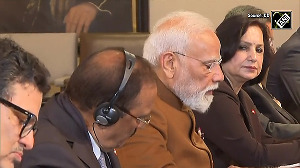India has never before faced such a tremendous window of opportunity to become a significant player in the global economy as now, Claude Smadja, president of Smadja Associates and former managing director of World Economic Forum, said in Hyderabad on Wednesday.
Speaking at the Tenth Partnership Summit 2004 organised by the Confederation of Indian Industry, Smadja pointed out that a combination of four primary factors, both at the global and domestic level, led to the creation of this unprecedented prospects for India.
Why India is booming
- Spelling out these positive factors, he said the first was the emergence of a new mood of confidence in India Inc.
This confidence was based on strong macro indicators, such as foreign exchange reserves of over $100 billion and a realisation that the progress made in the last 12 years of reform was merely a curtain raiser for the higher growth to follow.
- The second factor was the clear sign of a global economic recovery, which meant that global companies were on the lookout for making investments in emerging countries.
The global recovery was also exerting pressure on companies to cut costs. Both these provided tremendous opportunity for India to emerge as a high quality sourcing base.
- Smadja said the third factor was the breakthrough in the negotiations with Pakistan.
Lowered tensions with Pakistan would increase India's investment climate and also ensure that security tensions do not force the government to shift focus from important economic reforms.
- The fourth factor was the settling down in the surge of foreign direct investment flows into China.
This would shift the focus of global companies to India and enhance the flow of FDI into India.
How can India can be a global powerhouse
He identified a seven-point agenda for India to harness the full potential of this window of opportunity.
- India would need to develop a strong manufacturing base and increase the share of the manufacturing sector in the GDP (gross domestic product).
- Indian corporate sector also needed to go global -- both in terms of acquisitions abroad and partnerships within the country.
- The Indian corporate sector needed to forcefully move towards delivering higher value in terms of efficiency, technology, quality and products.
- India would also need to increase the focus and step up the expenditure on infrastructure.
- It is also necessary to enhance productivity in the agricultural sector.
- Close focus on human development was required by increasing the expenditure in education and health care sectors.
- Last but not the least, the central and state governments would do well to address the problem of burgeoning fiscal deficit.
But there are some risks too...
Welcoming the signs of revival in the global economy and the strong 'feel good' factor prevailing in the Indian economy, Smadja also identified five risk factors that could derail the revival of the global economy and also jeopardise the high economic growth experienced in India.
- The rapid decline in the value of the dollar was the first risk factor.
The dollar had witnessed a loss in value by 30 per cent in the last few months and if this trend continued, there could be a severe crisis in the global financial markets.
- The security tensions that had emerged globally in recent weeks constituted the second risk factor.
Speculation over another terrorist attack against the United States coupled with the continued uncertainties in Iraq could together dampen business confidence.
- The economic and institutional crisis brewing in Europe was such that nobody was in a position to accurately predict the political and economic manifestations that would result due to the enlargement of the European Union from the present 15 members to 25 members in May 2004.
Given the prevailing crisis in Europe, it was the worst possible time for an expansion in the European Union, he pointed out.
- The signs of overheating exhibited by the Chinese economy were the fourth risk factor.
Over the recent years, the growth in the Chinese economy took place under an extremely lax fiscal policy and as a result, there were clear signs of overheating in the context of borrowing and government expenditure.
To maintain sustainable growth, it was possible that the Chinese government might decide to put a break on growth. If this happened, it could have a severe impact on the growth prospects of the global and Indian economy.
- The increased tensions and geopolitical complexities ingrained in the globalisation process constituted the fifth risk factor.
If there were no positive developments with regard to the Doha negotiations in the next five to six weeks, it was unlikely that anything on that front would materialise in 2004, he cautioned.





